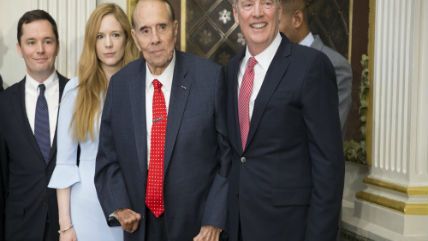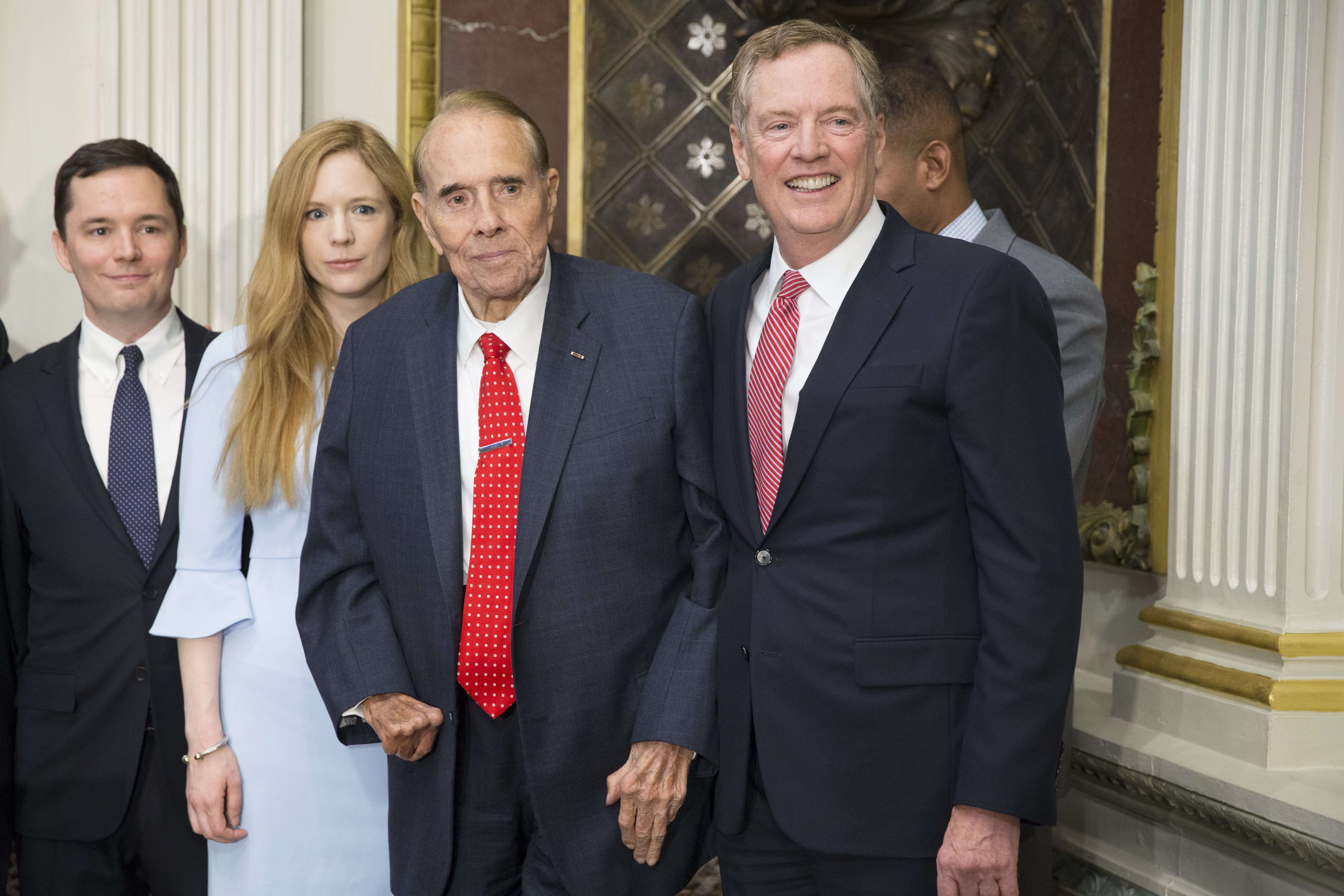Trump Administration Announces Its NAFTA Renegotiation Concerns
Many of them echo old labor union and Democratic Party complaints about freer trade.

Donald Trump's rhetorical hostility to free trade and his apparent desire to manage U.S. companies' investment decisions over an obsession with "balance of trade" has been one of his most alarming characteristics to some libertarians.

Letters from Trump's U.S. Trade Representative Robert Lighthizer to various congressional leaders sent this week set forth the current contours of the Trump administration's concerns over renegotiating NAFTA, which can be summed up as, to quote the letter:
new provisions to address intellectual property rights, regulatory practices, state-owned enterprises, services, customs procedures, sanitary and phytosanitary measures, labor, environment, and small and medium enterprises.
It also notes they want "aggressive enforcement of…commitments made by our trading partners." And they start with the nerve-wracking declaration that a prime goal in trade deal renegotiating will be to "support higher-paying jobs in the United States" and "improving U.S. opportunities" (by which they almost certainly don't mean opportunities for citizens and companies to buy abroad as cheaply and efficiently as they'd like).
A lot of that language quoted above sounds like the Republican Trump administration just echoing lots of traditionally labor union and Democratic Party concerns over the alleged damage that allowing freer overseas trade causes.
Some trade reporters are pleased that the Lighthizer letters don't seem dedicated to completely upending NAFTA, an act which, whatever NAFTA's flaws, would be worse (with Trump's trade opposition ideology ruling executive policy) than the alternative.
John Brinkley at Forbes, for example, is pleased that Lighthizer's letters "included none of the bluster and hostility that President Trump has directed at America's NAFTA partners, Canada and Mexico" and notes that despite bluster about improving rule enforcement under NAFTA in a more U.S.-friendly direction, that "since 1994, the United States has prevailed in every NAFTA ISDS [Investor State Dispute Settlement] complaint that it has filed or has been filed against it and that has proceeded to a final ruling. It's going to be hard to improve on that."
Brinkley is hopeful that the reference to "small" enterprises in Lighthizer's letter, quoted above, might mean that the administration wants to "focus on ways to make it easier for small companies to qualify for duty-free treatment under NAFTA….It's easy for big corporations to comply with the myriad rules and regulations that cover imports, exports and free trade agreements; they can hire armies of lawyers and trade specialists to manage compliance with them. Most small firms can't do that and many find that compliance isn't worth the time and money. So, they don't export. Or they export without applying for duty-free treatment under NAFTA."
An article in Business Day is similarly optimistic, noting for those scared about earlier Trumpian rhetoric that the Lighthizer letters:
omitted many of the thorny points cited in an earlier draft, such as leveling the playing field on tax treatment and bulking up "Buy America" procurement provisions — goals that might meet stiff resistance from Canada and Mexico….
Still, Lighthizer made it clear the US wants to see Mexican manufacturing capacity return to America, an approach sure to create friction with Mexico ahead of a general election next year. Mexico would also likely oppose efforts to compensate US producers for Mexico's VAT, which refunds taxes charged on inputs used to produce exported goods. While US politicians have called the tax an unfair subsidy, Mexico argues the system is in line with international trade rules.
Talks with Canada could trip up over irritants including access to the country's supply-managed dairy sector or the ongoing dispute over softwood lumber exports to the US
The US president will be under pressure to reach a deal that shows his election promises weren't empty rhetoric, said Dan DiMicco, a former steel executive who advised Trump during the campaign. The administration will measure success in terms of its ability to stop US companies from building plants in Mexico, and reducing the $62bn deficit with that nation, he said.
That would be a terrible, though terribly Trumpian, way to measure the goods and bads of freer international trade. Still, learning the administration's specific goals as they'll effect American companies in practice will unfold as the negotiations unfold, with these Lighthizer letters starting a 90-day clock after which the official renegotiations can begin.
In other trade policy news, the Trump administration is officially not 100 percent behind House Republicans' plans for a "border adjustment tax" as CNBC reports in a story mostly about how many large U.S. retailers are lobbying against it:
The White House made no mention of border adjustment in the one-page summary of its tax reform principles released last month. However, [Treasury Secretary Steven] Mnuchin has said that the proposal needs to be revised.
"There's many aspects of it we like. There's certain things we're concerned about," Mnuchin said during a conference last month. "What we discussed with [Ryan and Brady] is we don't think it works in its current form, and we'll continue to have discussions with them about revisions that they will consider."
Richard McKenzie, an economist writing for the National Center for Policy Analysis (who spoke to Reason TV back in 2010 on why the stimulus wasn't working), concludes that "If the BAT [border adjustment tax] has the intended effects on imports and exports…many of the prior mutual benefits of international trade will be lost and production costs around the globe will go up. The result: a necessary reduction in aggregate real income, but one that is unequally distributed. Some U.S. firms and workers would gain, but other worker groups would lose more than these gains."
Turning international trade policy into even more such a game of crony advantage seems to be one of Trump's core beliefs, if he has any. But for right now, Senate Majority Leader Mitch McConnell (R-Ky.) says, according to Fox News today, that such a tax would not get through the Senate.


Show Comments (38)